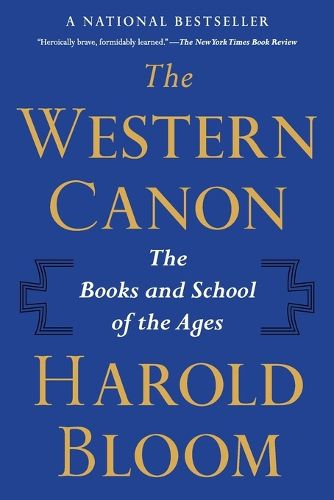Readings Newsletter
Become a Readings Member to make your shopping experience even easier.
Sign in or sign up for free!
You’re not far away from qualifying for FREE standard shipping within Australia
You’ve qualified for FREE standard shipping within Australia
The cart is loading…






The literary critic defends the importance of Western literature from Chaucer and Shakespeare to Kafka and Beckett in this acclaimed national bestseller.
"An impressive work...deeply, rightly passionate about the great books of the past."-Michael Dirda, The Washington Post Book World
Harold Bloom's The Western Canon is more than a required reading list-it is a "heroically brave, formidably learned" defense of the great works of literature that comprise the traditional Western Canon. Infused with a love of learning, compelling in its arguments for a unifying written culture, it argues brilliantly against the politicization of literature and presents a guide to the essential writers of the western literary tradition (The New York Times Book Review).
Placing William Shakespeare at the "center of the canon," Bloom examines the literary contributions of Dante Alighieri, John Milton, Jane Austen, Emily Dickenson, Leo Tolstoy, Sigmund Freud, James Joyce, Pablo Neruda, and many others. Bloom's book, much-discussed and praised in publications as diverse as The Economist and Entertainment Weekly, offers a dazzling display of erudition and passion.
$9.00 standard shipping within Australia
FREE standard shipping within Australia for orders over $100.00
Express & International shipping calculated at checkout
The literary critic defends the importance of Western literature from Chaucer and Shakespeare to Kafka and Beckett in this acclaimed national bestseller.
"An impressive work...deeply, rightly passionate about the great books of the past."-Michael Dirda, The Washington Post Book World
Harold Bloom's The Western Canon is more than a required reading list-it is a "heroically brave, formidably learned" defense of the great works of literature that comprise the traditional Western Canon. Infused with a love of learning, compelling in its arguments for a unifying written culture, it argues brilliantly against the politicization of literature and presents a guide to the essential writers of the western literary tradition (The New York Times Book Review).
Placing William Shakespeare at the "center of the canon," Bloom examines the literary contributions of Dante Alighieri, John Milton, Jane Austen, Emily Dickenson, Leo Tolstoy, Sigmund Freud, James Joyce, Pablo Neruda, and many others. Bloom's book, much-discussed and praised in publications as diverse as The Economist and Entertainment Weekly, offers a dazzling display of erudition and passion.